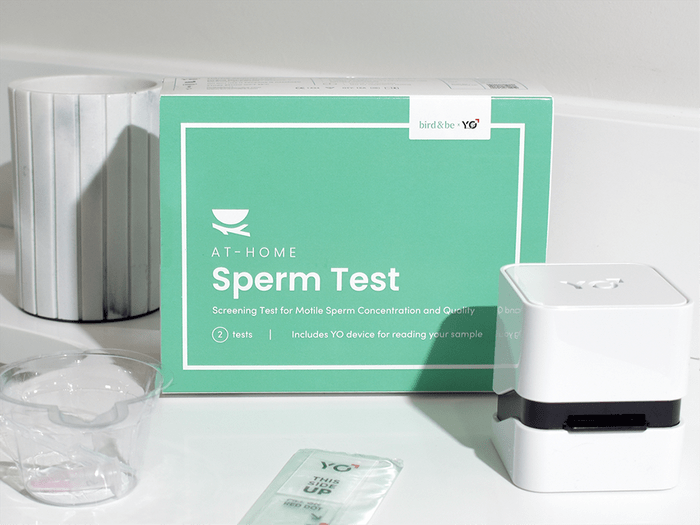Finally—At-Home Fertility Tests for Men

A new Canadian company offers sperm tests that deliver accurate results in just two minutes.
For people having difficulty trying to conceive, one of their first steps is to see a fertility specialist. The female partner is typically given a blood test and a physical examination, then referred to get an ultrasound and X-ray, and maybe prescribed medication, too. The male partner? Chances are, nothing.
“Men’s fertility has often not been recognized as a contributing factor [to infertility],” says Dr. Jesse Ory, assistant professor in the Department of Urology at Dalhousie University. Traditionally, when a couple has infertility issues, the referrals and tests start with the female partner. “If everything’s okay, then the male partner may be given a sperm test,” says Ory.
But up to half of infertility cases are caused by male factor infertility, so “both partners should really receive tests at the same time,” he says. The reason they haven’t been? The responsibilities of reproductive health have fallen more heavily on women. “This is compounded by the fact that there is often more medical pressure on women to get evaluated since as women get older, their ability to reproduce goes down,” says Ory. “This age-related decline in fertility is not as present in men.”
If you’re interested in accelerating the fertility process or gaining more personal information, you could take matters (quite literally) into your own hands with an at-home sperm test.
Male Fertility Tests
In March 2022, Canadian company Bird&Be launched an at-home test kit that screens for low sperm count and motility (the ability to move efficiently to the egg)—something that hasn’t been readily accessible in Canada before. Founders Samantha Diamond and Breanna Hughes developed the test with YoSperm and Medical Electronic Systems, the largest provider of automated sperm quality analyzers used in hospitals, universities and IVF centres around the world, to help people gain insight into their fertility in the most convenient (and private) way possible.
A typical sperm test at a doctor’s office examines a semen sample for sperm concentration, health and movement. But the test isn’t exactly easy—it requires men and people with sperm to masturbate in a collection cup and drop it off at a lab to test within an hour of ejaculating. “It’s especially difficult for those in rural areas,” says Ory, not to mention time-consuming and expensive.
(Related: This Canadian Company Made Pregnancy and Ovulation Tests So Much Better)
How does an at-home sperm test work?
Similar to an in-office test, Bird&Be’s kit measures sperm count against the healthy level indicated by the World Health Organization, which is 15 million sperm per millilitre, says Diamond. It can also detect low motile sperm, which is sperm that swim too slowly or twitch in place (healthy sperm swim quickly and towards the egg). That’s why it’s important to know both sperm count and mobility: having over 15 million sperm per millilitre doesn’t necessarily mean a person is fertile if his sperm moves slowly, says Ory.
Bird&Be’s sperm test calls for a bit of a science experiment, says Diamond. It involves collecting the semen sample in a provided cup, adding a liquefaction powder, waiting a few minutes, mixing the solution and then extracting some of the sample and dropping it onto a slide, which goes into a device that records a video of the sperm. The results, which have a 97 percent accuracy rate, will then be sent to an app on your phone within two minutes. “The test also provides a score that puts your result in the context of other people with sperm who have had children,” says Diamond.
Who can benefit from sperm tests?
At-home tests are best for people who are simply curious about their sperm count, so they can get a better idea if it’s low or abnormal. “It’s a great thing to know so you can expedite a referral to a specialist,” says Ory. But if the score is low, there’s no reason to panic—sperm regenerate every two to three months and can respond to new healthy habits.
There are limitations with at-home tests, Ory warns, and sometimes an in-office test is still necessary. “Sperm tests in a clinic can test sperm morphology, which is essentially how it looks under the microscope,” says Ory. Meaning, does it look normal? Is the tail of the sperm crooked? Does the head of the sperm look abnormal? “An at-home test kit won’t be able to tell you that because the results need to be interpreted by a trained lab technician and andrologist or embryologist.”
What impacts male fertility?
Low sperm count and motile sperm can be caused by lifestyle choices or a random genetic abnormality, says Ory. Signs of infertility for men and people with sperm include having unprotected sex for a long time and not getting a partner pregnant, a history of a bad testicular infection, low testosterone, having small testicles and having a varicocele, which is enlarged veins in the scrotum, he says. Unlike egg count for women, sperm count isn’t significantly impacted by age—but age can affect sperm quality.
What can men and people with sperm do to boost their fertility?
Anyone who’s having trouble conceiving should get a referral to a fertility specialist. According to Ory, the initial appointment will include a discussion about their health history, reviewing factors that may influence fertility, bloodwork, a look at the hormones in their brain that trigger testicles to make sperm (like testosterone), a physical examination and, of course, a sperm test.
“There is an incorrect assumption that if a guy has low testosterone, he should be given testosterone to boost his sperm count,” says Ory. “But if you give a guy a testosterone injection, it will act as a contraceptive and his sperm count will go down to zero.” Instead, the right medications (such as HCG and clomiphene or tamoxifen) and healthy lifestyle changes can boost the body’s testosterone production naturally, and thereby boost sperm count. According to Ory, exercising, eating healthy, quitting smoking and stopping cannabis use can all improve sperm quality.
Of course, the first thing people can do to boost their fertility is to learn what they’re working with–and taking an at-home test is a good place to start.
Bird&Be’s At-Home Sperm Test is available now for $42 at birdandbe.com.




